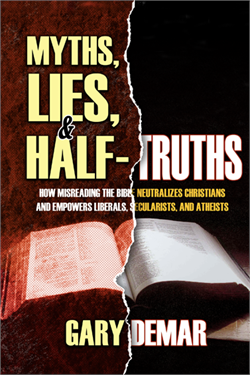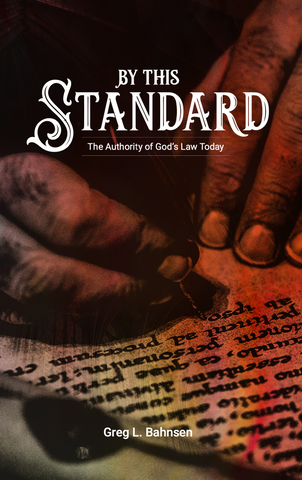“Just preach the gospel.” How many times have you heard pastors and critics of social and political action scold Christians concerned about the moral direction the church is taking for mixing the gospel with politics? The gospel is more than a life insurance program or a “Get Out of Hell Free” card. It is to transform everything we think about and act on. There is no neutrality or areas that are off limits to the application of God’s Word.
The gospel renews a life for service in God’s kingdom—an ever-present reality—via a changed heart and mind (Rom. 12:1-2). What are we to do with these two renewals? Wait to be taken to heaven in something called a “rapture,” live in the world God created and called “good” (Gen. 1:31; 1 Tim. 4:1-4) and allow the enemies of God to exercise dominion over it, claim that since Jesus didn’t get involved in politics that Christians should follow His example, or learn how the Bible applies to every area of life and make it our life’s work to transform every part of it?

Myths, Lies, and Half-Truths
Myths, Lies, and Half-Truths takes a closer look at God's Word and applies it to erroneous misinterpretations of the Bible that have resulted in a virtual shut-down of the church's full-orbed mission in the world (Acts 20:27). Due to these mistaken interpretations and applications of popular Bible texts to contemporary issues, the Christian faith is being thrown out and trampled under foot by men (Matt. 5:13).
Buy NowThe late Christian apologist Francis A. Schaeffer (1912-1984), wrote the following in the Preface to his 1974 book The Great Evangelical Disaster:
Throughout all of my work there is a common unifying theme, which I would define as “the Lordship of Christ in the totality of life.” If Christ is indeed Lord, he must be Lord of all life—in spiritual matters, of course, but just as much across the whole spectrum of life, including intellectual matters and the areas of culture, law, and government. I would want to emphasize from beginning to end throughout my work the importance of evangelism (helping men and women come to know Jesus Christ as Savior), the need to walk daily with the Lord, to study God’s Word, to live a life of prayer, and to show forth the love, compassion, and holiness of our Lord. But we must emphasize equally had at the same time the need to live this out in every area of culture and society.[1]
Schaeffer saw the problem decades ago in what he described as “a shift in worldview—that is, through a fundamental change in the overall way people think and view the world and life as a whole … to a world view based upon the idea that the final reality is impersonal matter or energy shaped into its present form by personal chance.”[2]
We have been told that government can’t save us, and by government, they mean civil government, the State. Whoever said it could or should try to? What Christians are not often taught is that there are multiple decentralized governments, family, church, and civil governments—plural. Government is not solely political. The civil sphere of government was ordained by God and is said to be a “minister of God to you for good” (Rom. 13:4). How can civil government be “good” if good people are not involved and turn over civil governing authority to people who despise God’s moral standards (see Psalm 1)?
Without good self-government under God, the three governments, no matter how well conceived, will fail. Let us not forget that God is the Supreme Governor of all things and is the creator of family, church, and civil governments. These are God’s governments. He has not determined that they remain in the hands of those who hate His law so they can be redesigned in the name of another god or in terms of some claim of neutrality. No one is neutral.
According to a radio editorial I heard, “a man’s religion and the strength of his conviction are his own personal matter” and therefore “religion should not interfere with politics.”[3] This is an expression of humanist “neutrality” designed to silence Christians but allow for every other conceivable worldview to find expression in the public and political arenas.
Let’s apply the neutrality logic to Germany in the 1930s and 1940s. Should the churches have remained neutral because they were churches, and their denouncement of Hitler and his policies would have been fundamentally religious? In fact, this is exactly what many churches did do and for what they believed were sound theological reasons. “Religion was a private matter that concerned itself with the personal and moral development of the individual. The external order—nature, scientific knowledge, statecraft—operated on the basis of its own internal logic and discernable laws.”[4]
Christians were told they had to submit to this external order since the State was seen as the autonomous authority of the public order. The church’s sole concern was man’s spiritual life. The church followed one set of rules which were religious, while the State took a religiously “neutral” position. “The Erlangen church historian Hermann Jorda declared in 1917 that the state, the natural order of God, followed its own autonomous laws while the kingdom of God was concerned with the soul and operated separately on the basis of the morality of the gospel.”[5] It was because of this disjunction—built on the myth of neutrality—that Hitler could carry out his devilish schemes unhindered by most religious people. The “Confessional Church,” however, took a different, non-neutral, position:
[It] opposed the Nazification of the Protestant churches, rejected the Nazi racial theories and denounced the anti-Christian doctrines of Rosenberg and other Nazi leaders. In between lay the majority of Protestants, who seemed too timid to join either of the two warring groups, who sat on the fence and eventually, for the most part, landed in the arms of Hitler, accepting his authority to intervene in church affairs and obeying his commands without open protest.[6]
Those “who sat on the fence,” having fallen for the neutrality myth, supported Hitler by default. While they did not openly join with the “German Christians,” a pro-Hitler alliance of ministers and churches, their inaction “landed them in the arms of Hitler” anyway. So much for neutrality and being at peace with the world.
Evangelicalism has had a mixed history on how to apply the Bible to all of life. For years I heard that the Bible applies to every area of life but rarely have I seen or heard evangelical leaders explain how it applies in the details. Many Christians have been taught, “We’re under grace not law.” But when asked if this means that it is now OK for Christians to steal, murder, commit adultery, lie, and covet, these same Christians dismiss such an objection. They might say, “If a law is repeated in the New Testament, it still applies.” There is no such directive in the New Testament that says you should not curse the deaf or trip the blind (Lev. 19:14) or have sex with animals (18:23).
It is true that the law does not save anyone or that keeping a list of commandments makes us holy, but this does not mean that God’s law is irrelevant. Paul writes the following to Timothy.
But we know that the Law is good, if one uses it lawfully, realizing the fact that law is not made for a righteous person, but for those who are lawless and rebellious, for the ungodly and sinners, for the unholy and profane, for those who kill their fathers or mothers, for murderers and immoral men and homosexuals and kidnappers and liars and perjurers, and whatever else is contrary to sound teaching, according to the glorious gospel of the blessed God, with which I have been entrusted (1 Tim. 1:8-11).
Note how the law and the gospel are not mutually exclusive because the proper use of the law is determined by the law and is “according to the glorious gospel of the blessed God, with which [Paul had] been entrusted.”

By This Standard: The Authority of God's Law Today
God's Law is Christianity's tool of dominion. This is where any discussion of God's law ultimately arrives: the issue of dominion. Ask yourself: Who is to rule on earth, Christ or Satan? Whose followers have the ethically acceptable tool of dominion, Christ's or Satan's? What is this tool of dominion, the Biblically revealed law of God, or the law of self-proclaimed autonomous man? Whose word is sovereign, God's or man's?
Buy NowLike God’s creation, the Law is good. God’s commandments are good. Jesus said to His disciples, “If you love Me, you will keep My commandments” (John 14:15). Is Jesus divided? John writes, “For this is the love of God, that we keep His commandments; and His commandments are not burdensome” (1 John 5:3). Jesus’ commandments are God’s commandments. R. J. Rushdoony writes.
Lawless Christianity is a contradiction in terms: it is anti-Christian. The purpose of grace is not to set aside the law but to fulfil the law and to enable man to keep the law. If the law was so serious in the sight of God that it would require the death of Jesus Christ, the only-begotten Son of God, to make atonement for man’s sin, it seems strange for God then to proceed to abandon the law! The goal of the law is not lawlessness, nor the purpose of grace a lawless contempt of grace.[7]
Without an appreciation for God’s law there is no way to combat lawlessness and the redefinition of everything from abortion to same-sex sexuality. Many of today’s churches have accepted homosexuality as a legitimate lifestyle choice and twist the Scriptures to justify their position. And why not? Christians have been taught that God’s law (just some of it) is either (1) only for the church or (2) grace supplants biblical law. It’s a double whammy making the Christian message irrelevant this side of heaven.
[1] Schaeffer, The Great Evangelical Disaster (Westchester, IL: Crossway Books, 1984), 12.
[2] Schaeffer, The Great Evangelical Disaster, 36.
[3] Heard on WGST radio station, Atlanta, Georgia (September 12, 1986).
[4] Richard V. Pierard, “Why Did Protestants Welcome Hitler?,” Fides et Historia (North Newton, KS: The Conference on Faith and History), X:2 (Spring 1978), 13
[5] Pierard, “Why Did Protestants Welcome Hitler?,” 14.
[6] William L. Shirer, The Rise and Fall of the Third Reich (New York: Simon and Schuster, 1960), 236. Emphasis added.
[7] Rousas J. Rushdoony, The Institutes of Biblical Law (Phillipsburg, NJ: Presbyterian and Reformed, 1973), 4.

